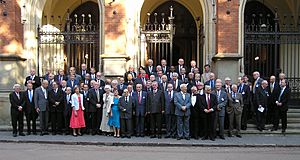Institut de Droit International facts for kids
|
Institut de Droit International
|
|
 |
|
| Abbreviation | IIL, IDI |
|---|---|
| Formation | 8 September 1873 |
| Founded at | Ghent, Belgium |
| Type | NGO, IGO, Society |
| Legal status | Institute |
| Purpose | Promote the progress of international law |
| Headquarters | Geneva, Switzerland |
|
Region
|
Worldwide |
| Methods | Scientific research, publications, teaching and lobbying |
| Fields | International law |
|
Secretary-General
|
Marcelo Kohen |
| Affiliations | Consultant - ECOSOC Consultant - HCCH |
| Website | www.idi-iil.org |
The Institute of International Law (also known as Institut de Droit International in French) is a special group of experts. They study and help create rules for how countries interact. These rules are called international law. The Institute is made up of some of the best international lawyers from around the world. In 1904, they won the famous Nobel Peace Prize!
A Look at History
The Institute was started on September 8, 1873. It was founded by Gustave Moynier and Gustave Rolin-Jaequemyns. They were joined by nine other well-known international lawyers. The first meeting happened in the Town Hall of Ghent, Belgium.
The founding members were:
- Pasquale Stanislao Mancini (from Rome)
- Emile de Laveleye (from Liege)
- Tobias Michael Carel Asser (from Amsterdam)
- James Lorimer (from Edinburgh)
- Wladimir Besobrassof (from Saint-Petersburg)
- Gustave Moynier (from Geneva)
- Jean Gaspar Bluntschli (from Heidelberg)
- Augusto Pierantoni (from Naples)
- Carlos Calvo (from Buenos Aires)
- Gustave Rolin-Jaequemyns (from Ghent)
- David Dudley Field (from New York)
Another lawyer, August von Bulmerincq from Tartu, was also invited. He couldn't make it to the first meeting. But he was still counted as one of the important founding members.
Celebrating 150 Years
In September 2023, the Institute celebrated a big milestone. It was their 150th anniversary! The celebration took place in Angers, France. Important government ministers from France attended. The President of France, Emmanuel Macron, and the United Nations Secretary General, António Guterres, sent video messages.
During this special event, the Institute also released a documentary film. This film tells the story of the organization. It features many famous international legal experts. It also includes judges from the International Court of Justice.
How the Institute Works
The Institute is a private group. It has different types of members: associates, members, and honorary members. There can't be more than 132 members and associates under 80 years old. New members are chosen every two years. They must be people who have done great work in international law. It's important that they can make decisions without political pressure. The Institute tries to have members from all over the world.
The organization holds meetings every two years. At these meetings, they study international law as it is now. They also suggest changes to make international law better. However, they do not get involved in specific arguments between countries.
The Institute's suggestions cover many parts of international law. Some of their ideas are especially important for human rights and solving problems peacefully. This is why they received the Nobel Peace Prize.
The Institute is still very active today. Their most recent meeting was in Angers, France, in August 2023. The main office of the Institute moves depending on where the Secretary-General is from. Right now, the main office is in Geneva, Switzerland. It is located at the Graduate Institute of International and Development Studies.
Current members of the Institute include many important people. There are famous lawyers, law professors, former ambassadors, and judges. Some are judges at the International Court of Justice. Others are judges at the International Tribunal for the Law of the Sea.
Recently, the Institute has made suggestions on many important topics. These include universal jurisdiction, temporary measures, rules for shipwrecks, and how countries use force.
The Institute publishes a yearly book called the Annuaire. This book contains reports from their committees. It also includes discussions from their main meetings. Any new rules or statements they make are also in the Annuaire. Records of their administrative meetings and elections are also found there.
The Institute's website has an online library. It contains their statements and resolutions. It also has works that are still being developed. These will be added to the Annuaire later.
See also
 In Spanish: Instituto de Derecho Internacional para niños
In Spanish: Instituto de Derecho Internacional para niños
 | May Edward Chinn |
 | Rebecca Cole |
 | Alexa Canady |
 | Dorothy Lavinia Brown |


